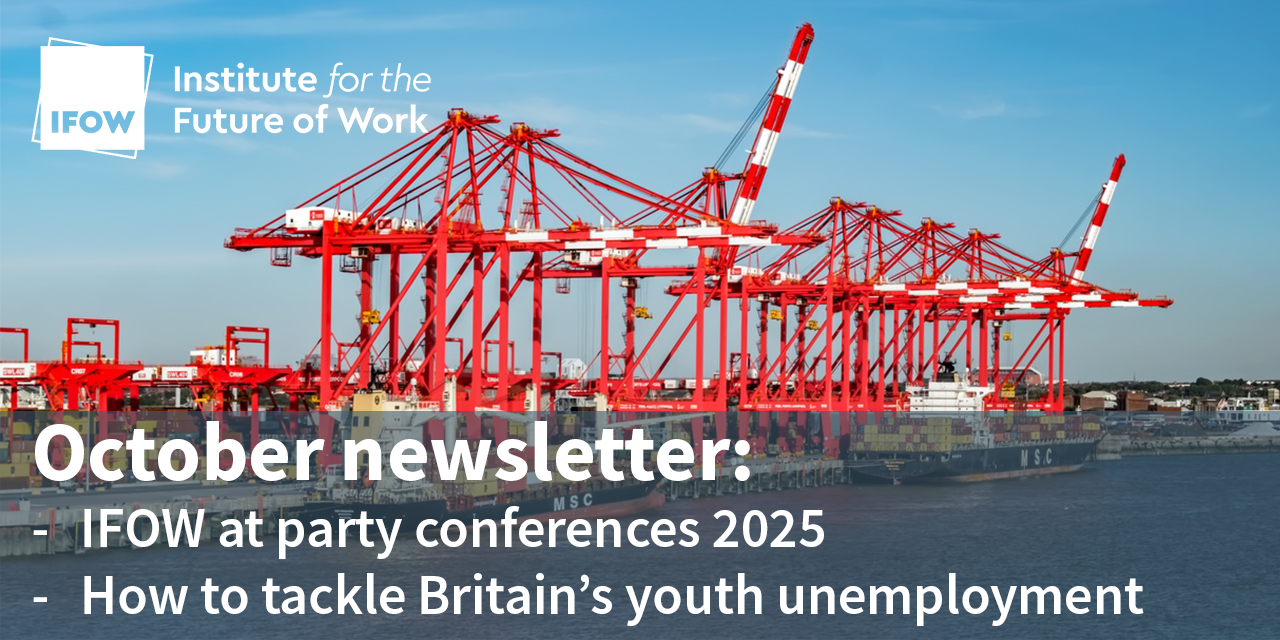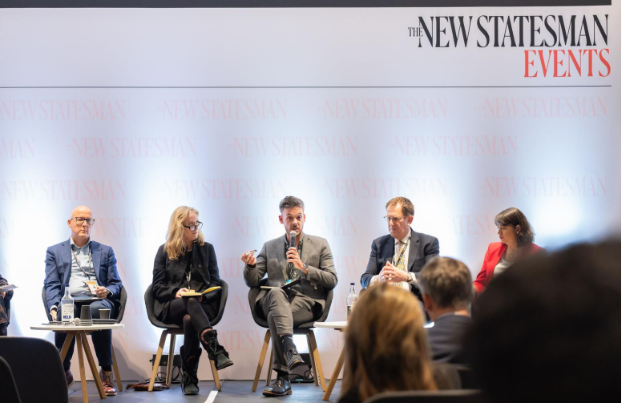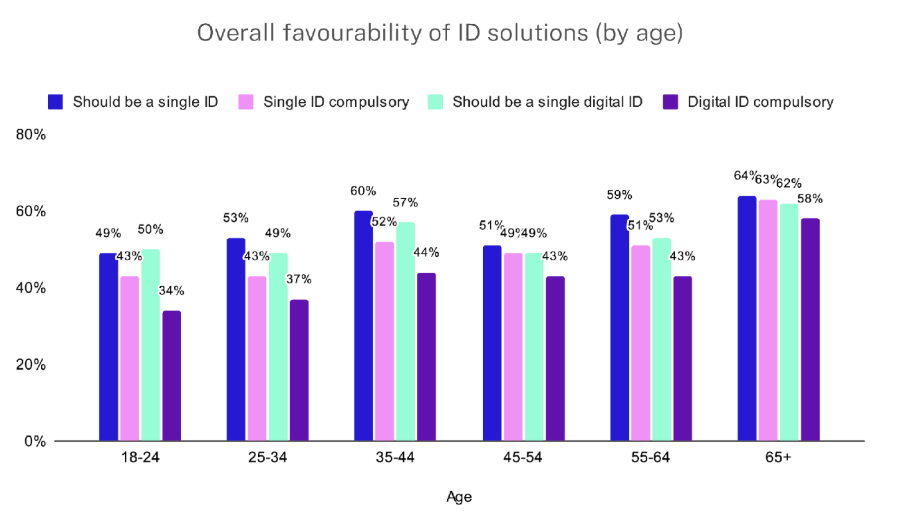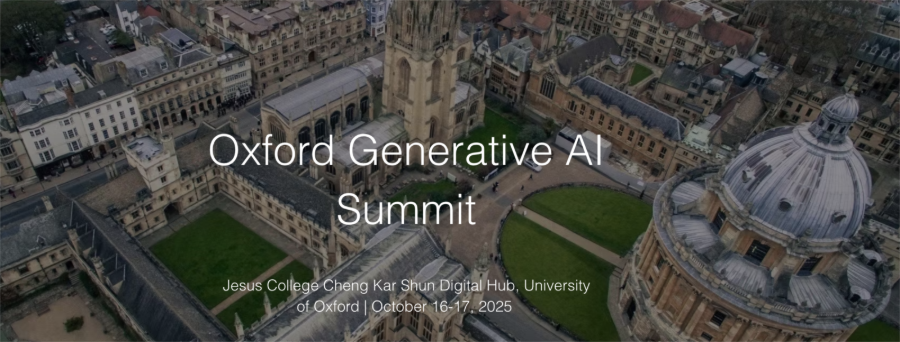We use cookies to personalise and enhance your experience on this site. By clicking Accept or continuing to use the site, you agree to our use of marketing and social media cookies as described in our Privacy Policy.
Accept and close
The end of September has seen renewed national focus on ensuring that young people in the UK are equipped with the right education, opportunities and skills needed to flourish in tomorrow’s job market. In line with this, IFOW team have spent the month travelling to different parts of the country to engage with governments, firms, unions and others.
In Birmingham we met with key stakeholders working in the West Midlands Combined Authority to share findings of our work exploring how young people from low-income backgrounds can thrive in a changing world of work. In Manchester and London we’ve run workshops with firms to deepen understanding of the role of HR and organisational strategies in AI adoption. In Grimsby we’ve worked with our Community Researchers as we look to use findings from our Pissarides Review to help people in the region access training and work opportunities in the green sector.
As you’ll read below, we’ve also been busy at party conferences, and on the airwaves, with Co-Director Abby Gilbert on BBC London News, and Associate Director Oliver Nash on BBC Radio London both responding to a new report on how AI is impacting jobs. We hope you enjoy our roundup of the best reads and events in the future of work space.
Anna and IFOW Team

This year, Labour Party conference was more about values and framing than policy announcements, and the Prime Minister has made clear moves to own narratives of optimism, renewal and unity.
The IFOW team were pleased to contribute to a wide range of panels and roundtable discussions on topics ranging from public perceptions of AI to skills-building, motivation and productivity. A new emphasis on the ‘how’ of value creation, access to good jobs and empowerment over populism were ideal scene-setters for IFOW’s continuing research and activities this year.
Good work transitions were kept centre stage, through the Youth Guarantee announcement for those on Universal Credit for at least 18 months, as well as the PM’s promise to increase numbers of young people in all forms of higher levels of education, equipping them with the skills to thrive in changing job markets.
To ensure the successful delivery of these aims, values-based, locally-led policy design is needed across the UK, including in the areas that are not a Devolution priority. Our research shows that good work mediates better outcomes, especially through periods of technological transformation, by acting as a lens through which opportunities and challenges are focused, and as a site of both regeneration and renewal of pride in place.
This message has now landed. Now it’s time to turn our attention to the role that these principles of good work will play in uniting people and places around common values and the common good.
We’re looking forward to heading to Manchester early next week – but for now a huge thank you to all our hosts and partners!
The impacts of using accelerating technologies at work is felt in varied ways across the workplaces globally. While digital nomads can travel while they work, labour migrants may find themselves trapped in digital platform work, as this report finds.
Place and place-based inequalities matter, which is why we developed the Disruption Index that mapped regional innovation readiness across the country. It’s also a driving principle behind our Flourish project, where we are leaning into the strategic opportunities presented by coastal communities in Cornwall and Lincolnshire, and working to increase the number of individuals in green training and work

According to this piece in the New Statesman, young people in Britain are ‘stuck in endless cycles of applying for phantom jobs that do not exist’. Looking to solutions, it outlines the robust legislation needed curb fake job ads and the associated costs to the state, and to fend off a mental health crisis.
In our Motivating Futures and Flourish projects, we’ve been working on interventions to help young people from low-income backgrounds access better jobs, while leveraging the regional opportunities afforded by the growth in green jobs and training.
Careful Industries recently did polling to find out what the country thought of Digital IDs, and this report unpacks these questions in light of the government's new announcements on their use to manage access to work.

Existing data protection laws often fail to safeguard workers in increasingly digitalised workplaces. This paper highlights the regulatory gaps across different jurisdictions, and proposes worker-centric data governance solutions to ensure fairer protection in the digital age.

Will Europe continue to rely on digital infrastructures dominated by the US and China’s big tech companies, or build its own democratic and public-led systems that serve people and planet? This policy brief by FEPS responds to this question, setting out a roadmap for strengthening European digital sovereignty.
Algorithmic wage discrimination and workplace surveillance first became widespread in ride-hail and online food delivery platforms, but these technologies are also becoming increasingly present in sectors like health care, customer service and retail, according to this issue brief by the Washington Centre for Equitable Growth.
With the Employment Rights and AI Bills in play, it is important that we learn from the situation in the US, and ensure that algorithmic decision-making systems in workplaces are only implemented with careful consideration of the impacts on good work. Read more about IFOW’s research into platform economies and the gigification of work in our report The Amazonian Era.
Abeba Birhane - Founder of the AI Accountability Lab (AIAL) at Trinity College Dublin – examines here the problems of too-easily promoting ‘AI for Social Good,’ arguing that AI systems will not – and cannot, by their construction - address historic inequalities, making this a particularly relevant piece as we head into Black History Month.
Rather than trusting ‘technosolutionism’, we need to reassert that ‘meaningful social change starts with acknowledging the root causes of existing inequalities, from gender-based violence to poverty and hunger. Overcoming them requires sustained effort and significant reallocation of resources.’

Rather than the wholesale job losses predicted by some, AI is radically transforming how work is organised, monitored, controlled and disciplined – producing new forms of managerial control while also creating points of contestation and windows of opportunity. With this context, DIGIT are hosting an online discussion on the place of AI in retail as they launch a new handbook on AI in retail work for unions operating in the sector.
This IES annual conference is an excellent chance to hear employment researchers and HR thinkers discuss routes to boosting productivity through more engaging work and workplaces, effectively managing the adoption of new technology, developing capabilities and promoting wellbeing. These are themes covered extensively in our Pissarides Review, the Final Report of which can be read here.
Join Carl Benedikt Frey, Professor of AI & Work at the Oxford Internet Institute, for the launch of his recent book How Progress Ends. The book charts technological advancements and shifts over the past 1000 years, both challenging the conventional belief that economic and technological progress is an inevitable trajectory, and warning that we cannot simply depend on any AI-fuelled great leap forward to manage the future.
This UKAuthority conference asks the question – what does the public sector need to do today to ensure it has the data foundations from which to unlock the full potential of AI?

Generative AI is fundamentally re-wiring the infrastructure underpinning our information, commercial and economic environments – alongside how we work, research and think as humans. This two-day summit brings together leaders exploring the adoption, societal implications and futures of AI and society. Join Anna Thomas MBE, IFOW Co-Founder and Director for a panel discussing the responsibilities of leaders, institutions, and individuals in shaping a future where AI serves our highest aspirations.
The FT’s Future of AI Summit 2025 returns in November with a focus on the rapidly advancing field of AI innovation, bringing together global experts on AI governance, regulation, machine learning, generative AI applications, predictive and prescriptive AI, deep learning and more.